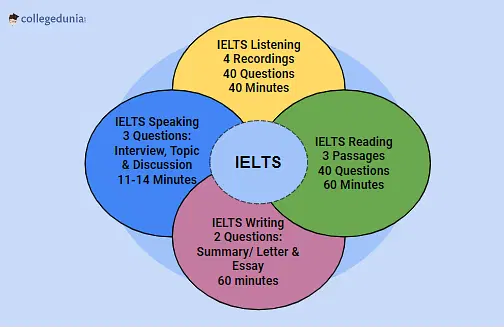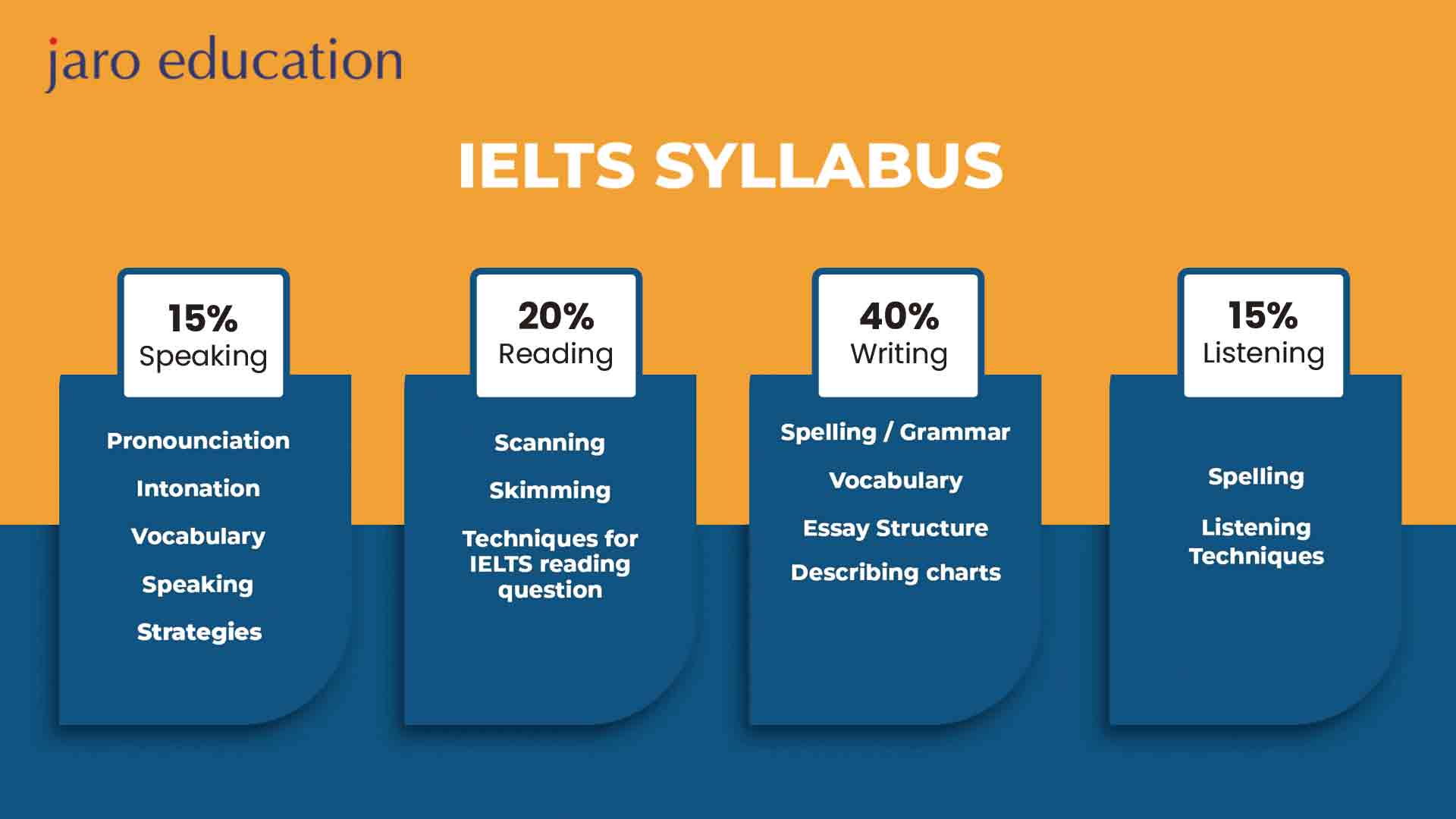
- jaro education
- 27, April 2024
- 10:00 am
The International English Language Testing System (IELTS) exam remains a lighthouse for the majority of candidates in search of life opportunities offered by their dream countries, which are English-speaking nations. Whether for studies, work, or immigration, an IELTS test can open many opportunities for its candidates. The above understanding of this all-important examination as we step into the year 2024 and plan for those 2025 intakes is brought out.
This blog aims to provide a comprehensive guide to navigate through each segment of the IELTS preparation process. We will start from the very basic understanding of the exam format to mastering each section and fine-tuning test day strategies, all to bring you actionable tips and resources designed to elevate your preparation and confidence levels as you approach the exam day.
Table of Contents
What is IELTS?
The IELTS test tries to test the use of English in four main areas: Listening, Reading, Writing, and Speaking. The test is designed to equip individuals who intend to engage with academic institutions, employers, and immigration bodies of the universe, to efficiently conduct English. The test is an admired one, which is accepted worldwide, with thousands of organizations acknowledging its fairness and reliability in measuring English proficiency skills.
With this, the IELTS exam will definitely transform by the year 2024: both in formats and in administrations, but its core—invariant spirit of the IELTS test—will remain quite well-preserved. Further, technological improvement in the emerging digital transformation in education and testing may make the examination process further improved, which will make it easier for individuals from different parts of the world to conduct the examination.
Preparing for the IELTS exam in the year 2024 would, of course, be a strategic approach that couples clear understanding with rigorous practice and planning in a definite, time-bound manner. The journey of getting an IELTS certification starts with a good understanding of the IELTS format, followed by intensive preparation that pinpoints the capability and weaknesses of each candidate. With the needed resources, guidance, and determination, the band score does seem like a real possibility for any candidate.
How to Prepare for the IELTS Exam?
Preparing for the IELTS exam requires a holistic approach to enhancing your English language proficiency in listening, speaking, reading, and writing. Here’s a detailed guide to help you prepare effectively:
Understand the Test Format
- Understanding the test format is essential for effective preparation for the IELTS exam. The exam consists of four main sections: Listening, Reading, Writing, and Speaking, each assessing different aspects of your English language proficiency
- Listening: This section evaluates your ability to comprehend spoken English through recordings of conversations and monologues. You’ll answer questions based on the information provided.
- Reading: In this section, you’ll encounter various texts like articles, reports, and essays, testing your reading comprehension skills as you answer questions to demonstrate your understanding of the content.
- Writing: The Writing section includes two tasks. Task 1 involves describing, summarizing, or explaining visual information (such as graphs or charts), while Task 2 requires writing an essay based on a given prompt. This section assesses your ability to express ideas clearly and cohesively in written form.
- Speaking: In the Speaking section, you’ll participate in a face-to-face interview with an examiner, divided into three parts: an introduction and interview, a short speech, and a discussion. Your spoken English skills, including fluency, pronunciation, vocabulary, and grammar, are evaluated in this section.

Assess Your Current Level
Evaluating your current proficiency level for the IELTS exam involves taking a comprehensive practice test under exam-like conditions, a crucial step in gauging your readiness. Start by obtaining a practice test from official IELTS materials or reputable language centers, ensuring it closely resembles the actual exam format. Create a conducive test environment by choosing a quiet location free from distractions and strictly adhering to the prescribed timings for each section: 30 minutes for Listening, 60 minutes for Reading, 60 minutes for Writing, and 11-14 minutes for Speaking. Avoid pausing during the test, except for official breaks, to replicate the authentic test experience accurately.
Set Clear Goals
Establishing clear and attainable goals is fundamental for successful IELTS preparation. Start by delineating your objectives and desired scores for each exam section. Take into account your motivations for taking the IELTS, such as studying abroad, pursuing career opportunities, or meeting immigration requirements, as well as the score prerequisites of your preferred institutions or employers.
For example:
- Academic IELTS test takers may aim for higher scores in the Reading and Writing sections to meet university admission criteria.
- General Training IELTS candidates may focus on achieving balanced scores across all sections for immigration or employment purposes.
Understanding your target scores will guide your study plan and help you allocate time and resources efficiently. It’s also beneficial to set milestones and track your progress throughout your preparation journey to stay motivated and focused.
Take IELTS Preparation Courses
Enrolling in an IELTS preparation course is a strategic decision for those who seek structured guidance or face a notable gap between their current English proficiency and their desired IELTS score. These courses, curated by experts, comprehensively cover all facets of the exam: listening, reading, writing, and speaking. They offer a systematic learning approach, dissecting each test component into manageable segments and delivering targeted practice to enhance skills in specific areas.
When selecting a course, thorough research is essential. Consider factors such as the course’s track record, instructor qualifications, format (online or in-person), and schedule flexibility to align with your commitments. Look for courses that provide abundant practice materials, mock tests mirroring actual exam conditions, and opportunities for personalized feedback, particularly for the writing and speaking sections.
Develop a Study Plan
Creating a well-structured study plan is crucial for effective IELTS preparation. Your study plan should cover all four sections of the exam and include dedicated time for daily practice sessions, reviews, and mock tests. Consistency is key to building and retaining language skills, so aim to allocate a balanced amount of time to each section based on your goals and areas of improvement. It should include the following:
- Listening: Allocate regular practice sessions to improve your listening skills. Use a variety of resources such as online platforms, podcasts, and audio materials to expose yourself to different English accents and styles. Focus on developing your ability to understand spoken English and enhance your note-taking skills during listening exercises.
- Reading: Dedicate time to improving your reading speed and comprehension. Read a wide range of materials, including articles, essays, and academic papers, to expand your vocabulary and familiarity with different writing styles. Practice skimming and scanning techniques to efficiently locate information within passages.
- Writing: Practice writing essays, reports, and letters within the time constraints of the exam. Focus on structuring your writing, using appropriate vocabulary and grammar, and expressing ideas clearly and cohesively. Review sample essays and seek feedback to refine your writing skills.
- Speaking: Hone your speaking skills by engaging in regular practice sessions with native speakers or language partners. Focus on fluency, pronunciation, vocabulary usage, and grammatical accuracy. Record yourself speaking and analyze areas for improvement.

*Kanan.co
Use Practice Materials
Utilizing official IELTS practice materials, sample tests, and online resources is essential to simulate exam conditions and enhance your preparation. Here’s how you can effectively use practice materials:
- Official IELTS Practice Materials: Access official IELTS practice materials provided by the British Council, IDP Education, and Cambridge Assessment English. These materials include sample tests, practice questions, and exam tips to familiarize yourself with the test format and question types.
- Sample Tests: Take regular practice tests to simulate exam conditions and assess your progress. Analyze your performance in each section, identify strengths and weaknesses, and prioritize areas that require improvement in your study plan.
- Online Resources: Explore a variety of online resources such as IELTS preparation websites, forums, and mobile apps that offer practice exercises, interactive quizzes, and study guides. These resources can provide additional practice opportunities and valuable insights into exam strategies.
Seek Feedback and Guidance
Seeking feedback from experienced teachers, tutors, or language experts is instrumental in identifying areas for improvement and receiving targeted guidance on specific language skills. Here’s how you can benefit from feedback and guidance:
- Feedback from Teachers/Tutors: Engage with teachers or tutors who specialize in IELTS preparation. Submit practice essays, speaking recordings, or practice test results for feedback on your performance and personalized recommendations for improvement.
- Language Experts: Consult with language experts or IELTS instructors who can provide detailed feedback on your language skills, including grammar, vocabulary, pronunciation, and fluency. Incorporate their suggestions into your study routine to enhance your overall proficiency.
- Study Groups/Preparation Courses: Consider joining study groups or enrolling in IELTS preparation courses offered by reputable institutions or language centers. Participating in group discussions, collaborative learning activities, and mock exams can provide valuable support, motivation, and insights from peers and instructors.
Register for the Exam
When you feel ready for the IELTS exam, it’s time to pick a date to take it. Make sure you choose a date that gives you enough time to go over everything one more time and to calm any nerves. Think about what else you have going on and pick a date when you know you can focus on the test without too many other things to worry about.
To sign up for the test, you’ll need to go to the official IELTS website or to a place that is allowed to take the test. There, you can see which dates you can choose from and where you can take the test. Make sure you know if you want to take the test on a computer or on paper because not all places offer both options.
Stay Motivated and Consistent
Staying motivated and consistent is paramount for IELTS success. Begin by setting clear goals, defining objectives, target scores, and study milestones. Organize your study schedule using calendars or apps, ensuring a focused, distraction-free environment. Reward yourself for progress and practice self-care to maintain energy and positivity. Combine these strategies with utilizing practice materials, seeking feedback, and adopting effective study techniques to enhance preparation and increase your likelihood of achieving desired scores in the IELTS exam.
Conclusion
Preparing for the IELTS exam requires dedication, practice, and strategic planning. By understanding the test format, setting clear goals, developing a structured study plan, and utilizing practice materials effectively, you can boost your confidence and performance on exam day. Remember to stay motivated, seek feedback, and maintain a consistent study routine to achieve your desired scores in the IELTS exam in 2024. If you’re looking to further enhance your career prospects, consider exploring courses from top universities through Jaro Education.









